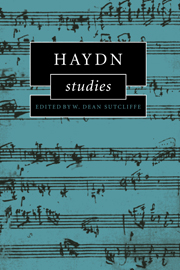Book contents
- Frontmatter
- Contents
- Preface
- Editor's note
- 1 The consequences of presumed innocence: the nineteenth-century reception of Joseph Haydn
- 2 Haydn's sacred vocal music and the aesthetics of salvation
- 3 Sentiment and sensibility in La vera costanza
- 4 Haydn as Romantic: a chemical experiment with instrumental music
- 5 Haydn's ‘Cours complet de la composition’ and the Sturm und Drang
- 6 Haydn's reversals: style change, gesture and the implication-realization model
- 7 Haydn's symphonies between Sturm und Drang and ‘Classical style’: art and entertainment
- 8 The Haydn piano trio: textual facts and textural principles
- 9 Papa Doc's recap caper: Haydn and temporal dyslexia
- 10 Haydn: the musicians' musician
- Index
4 - Haydn as Romantic: a chemical experiment with instrumental music
Published online by Cambridge University Press: 22 September 2009
- Frontmatter
- Contents
- Preface
- Editor's note
- 1 The consequences of presumed innocence: the nineteenth-century reception of Joseph Haydn
- 2 Haydn's sacred vocal music and the aesthetics of salvation
- 3 Sentiment and sensibility in La vera costanza
- 4 Haydn as Romantic: a chemical experiment with instrumental music
- 5 Haydn's ‘Cours complet de la composition’ and the Sturm und Drang
- 6 Haydn's reversals: style change, gesture and the implication-realization model
- 7 Haydn's symphonies between Sturm und Drang and ‘Classical style’: art and entertainment
- 8 The Haydn piano trio: textual facts and textural principles
- 9 Papa Doc's recap caper: Haydn and temporal dyslexia
- 10 Haydn: the musicians' musician
- Index
Summary
The early Romantics, it is said, formulated the idea of absolute music. If this is so, then its emergence at the close of the eighteenth century was muttered rather than announced by them. In fact, the Romantics were so reticent on the subject that they did not even name absolute music ‘absolute music’; that task was left to Wagner in the 1840s. The Romantics, however, did call instrumental music ‘pure music’, and this can be read as ‘absolute’, for they used the term to imply that instrumental music, as the essence of music, is the spirit of creativity itself. Music is pure poesis, claims Tieck; it is the ‘centre and circumference of all the arts’.
But what did this ‘Romantic music’ sound like to the Romantics? By the time someone like Schumann stylized Romantic philosophy as music, it was too late. When the Schlegel brothers, Novalis, Tieck and Schelling were writing in the late 1790s, Schumann was not even a gleam in his father's eye. There was no ‘Romantic music’ as we know it, only what we call ‘Classical music’. What the Romantics heard were the symphonies of Stamitz or Haydn and they renamed the music as their own. E. T. A. Hoffmann, in his celebrated review of Beethoven's Fifth Symphony, simply appropriates Haydn and Mozart as Romantic composers in retrospect.
The idea of absolute music is therefore not ‘Classical’ but ‘Romantic’.
- Type
- Chapter
- Information
- Haydn Studies , pp. 120 - 151Publisher: Cambridge University PressPrint publication year: 1998
- 3
- Cited by



